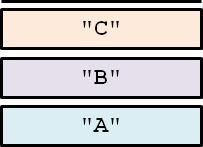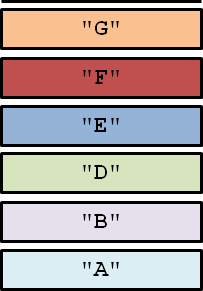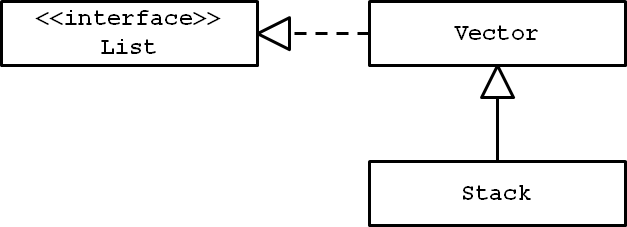











Examples covering inheritance, collections, and exceptions.
There are many examples of structures that nest.

for loops (or any loops for that matter)eCheck11B asks you to write a program that checks if a
mathematical expression involving (),
[], and {} is nested correctly.
The problem calls (),
[], and {} precedence characters.
Correctly nested:
(a + b) * (c + d)
a * (b * [c + d] + e)
(([[a + b] / c] + d) * e) + f
f * [g - h * {i + j * k}]
Incorrectly nested:
imbalanced (a + b) * (c + d
overlapping a * (b * [c + d) + e]
imbalanced (([[a + b] / c + d) * e) + f
overlapping f * [g - h * {i + j * k]}
A stack is a collection where the client can add and retrieve elements only from the "top" (beginning) of the collection. Adding an element is called a push and retrieving an element is called a pop. Popping an element effectively removes the element from the collection.
push "A"


push "B"


push "C"


pop


push "D", push "E", push "F", push "G"


StackJava provides a Stack class:

Critique this implementation based on your knowledge of what a stack is and inheritance in Java.
We can make two observations about valid expressions:
(, [, {
must be the same as the number of closing
precedence characters ), ], }.
for each character c in the string
{
if c is an opening precedence character
{
push c onto a stack
}
else if c is a closing precedence character
{
pop the stack
if the popped character does not pair with c
{
string is not valid
}
}
}
if the stack is not empty
{
string is not valid
}
else
{
string is valid
}
java.util.StackNote: this doesn't quite solve the eCheck. The eCheck tells you
to use type.lib.CharStack which implements a fixed-size
stack.
import java.util.*;
import java.io.*;
import java.nio.*;
public class Check11B
{
public static void main(String [] args)
{
PrintStream output = System.out;
Scanner input = new Scanner(System.in);
output.println("Enter expression");
String expression = input.next().trim();
Stack<Character> precedenceChars = new Stack<Character>();
try
{
for (int i = 0; i < expression.length(); i++)
{
char c = expression.charAt(i);
if (c == '(' || c == '[' || c == '{')
{
precedenceChars.push(c);
}
else if (c == ')' || c == ']' || c == '}')
{
char top = precedenceChars.pop();
if ((c == ')' && top != '(') ||
(c == ']' && top != '[') ||
(c == '}' && top != '{'))
{
throw new UnsupportedOperationException("Mismatched precedence character");
}
}
}
if (precedenceChars.size() != 0)
{
output.println("Imbalanced");
}
else
{
output.println("OK");
}
}
catch (EmptyStackException ex)
{
output.println("Imbalanced");
}
catch (UnsupportedOperationException ex)
{
output.println("Overlapping");
}
}
}